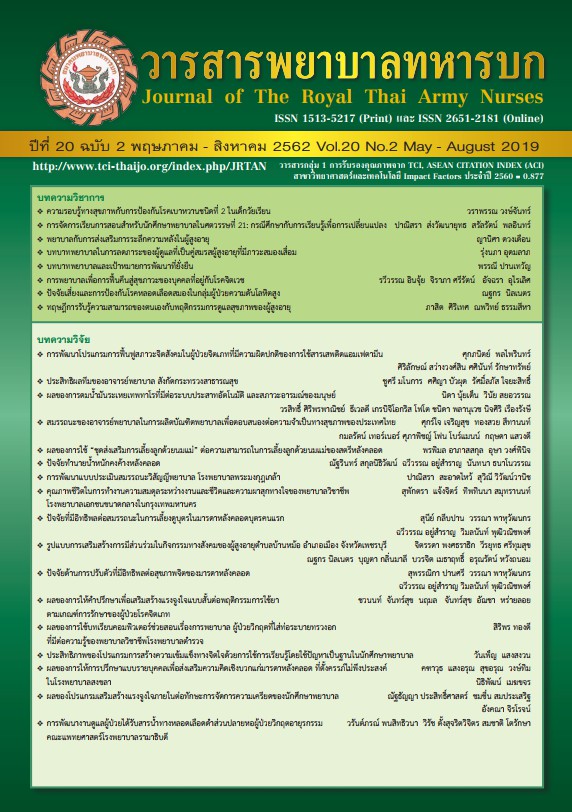Nursing Faculty Competencies to Produce Nursing Graduates in response to Population Health Needs in Thailand
Keywords:
nursing, competency, nursing faculty, health needsAbstract
Nursing faculty is recognized as a key person in producing nurses to address population health needs. The current population needs demand competent nurses to response effectively. Nursing faculty plays an important role in teaching pre-licensing nursing students to be qualified nurses. However, a little is known about competencies of nursing faculty members in Thailand. This study aimed to identify and propose a "model faculty member" in nursing in response to health needs of the population. Descriptive qualitative methods were applied. Review literature on faculty competencies in education and nursing profession lead researchers to develop semi-structure interview guide for focus group of stakeholders. Qualitative data from 3 groups of stakeholders, including 8 nursing students, 6 health sector employers, and 9 faculty members and administrators, were analyzed using content analysis combined with data from literature to formulate the model of faculty competencies. The propose model was validated by a group of 9 experts in nursing education. The result revealed that the model faculty composed of five key competencies, namely 1) nursing competencies, 2) pedagogy competencies, 3) personal development competencies, 4) ethical and moral competencies, and 5) research and academic services competencies. The finding is benefit to prepare the faculty necessary to educate future generations of nurses.
References
2. Southern Regional Education Board. Nurse educator competencies. Atlanta (GA): SREB; 2002.
3. National League for Nursing. Nurse educator core competency. Washington DC: NLN; 2005.
4. Klomsiri C. Nurse instructors’ competencies in Boromarajonani College of Nursing, Uttraradit. Thai Journal of Nursing Council 2006; 21: 61-74. (in Thai)
5. Thongcharoen V, Tantanadaecha S, Methakunavudhi P. Factors and indicators of professional standards for nursing faculties. J Nurs Sci Suppl 2010; 28: 55-66. (in Thai)
6. Sherman RO, Chiang-Hanisko L, Koszalinski R. The ageing nursing workforce: a global challenge. J Nurs Manag 2013 ;21: 899-902.
7. Sawaengdee K.The current nursing workforce situation in Thailand. Journal of Health Systems Research 2008 ;2: 40-6. (in Thai)
8. Ministry of Public Health. The 11th national health development plan under the national economic and social development plan B.E. 2555-2559. Bangkok: WVO Office of Printing Mill; 2012.
9. Elo S, Kyngas H. The qualitative content analysis process. J Adv Nurs 2008; 62: 107-15.
10. Adams R. Exploring dual professional identities, the role of the nurse tutor in higher education in the UK: role complexity and tensions. J Adv Nurs 2011; 67:884-92.
11. Saraketrin A, Rongmuang D, Chantra R. Nursing education in the 21st century: competencies and roles of nursing instructors. Journal of the Royal Thai Army Nurses 2019; 20:12-9. (in Thai)
12. Office of the Higher Education Commission. Thai Qualification Framework for Higher Education (TQF:HEd). Bangkok: The Office of Higher Education Commission; 2009.
13. Farber, Janice E, Bisko. The relationship between cultural experiences and perceived transcultural self-efficacy of nurse faculty. [Dissertation]. Chester (PA): Widener University; 2015
14. World Health Organization. Nurse educator core competency. Geneva: WHO; 2016.
15. Trilling B, Fadel C. Learning and innovation skills: 21st century skills learning for life in our times. San Francisco: Jossey-Bass; 2009.
16. Guy J, Tolhurst G. Reframing the Australian nurse teacher competencies: Do they reflect the “REAL” world of nurse teacher practice? Nurse Educ Today 2011; 31: 231-37.
Downloads
Published
How to Cite
Issue
Section
License
บทความหรือข้อคิดเห็นใดใดที่ปรากฏในวารสารพยาบาลทหารบกเป็นวรรณกรรมของผู้เขียน ซึ่งบรรณาธิการหรือสมาคมพยาบาลทหารบก ไม่จำเป็นต้องเห็นด้วย
บทความที่ได้รับการตีพิมพ์เป็นลิขสิทธิ์ของวารสารพยาบาลทหารบก
The ideas and opinions expressed in the Journal of The Royal Thai Army Nurses are those of the authors and not necessarily those
of the editor or Royal Thai Army Nurses Association.





